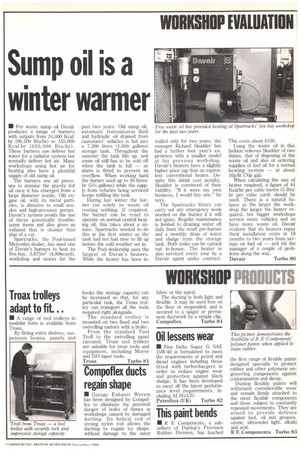Sump oil is a winter warmer
Page 105

If you've noticed an error in this article please click here to report it so we can fix it.
• For waste sump oil Davair produces a range of burners with outputs from 24,000 Kcal/ hr (96,500 Btu/hr) to 155,000 Kcal/hr (620,000 Btu/hr). These burners can deliver hot water for a radiator system but normally deliver hot air. Many workshops using hot air for heating also have a plentiful supply of old sump oil.
The burners use air pressure to atomise the gravity fed oil once it has emerged from a large diameter nozzle. Old engine oil, with its metal particles, is abrasive to small nozzles and high-pressure pumps. Davair's system avoids the use of these potentially troublesome items and also gives an exhaust that is cleaner than that of a car.
Spartrucks, the Pool-based Mercedes dealer, has used one of Davair's burners to heat its five-bay, 3,675m3 (4,806cuya workshop and stores for the
past two years. Old sump oil, automatic transmission fluid and hydraulic oil drained from customers' vehicles is fed into a 7,300 litres 0,600 gallons) storage tank. Throughout the summer the tank fills up, and some oil still has to be sold off when the tank is full — an alarm is fitted to prevent an overflow. When working hard the burner used up to 26 litres/ hr (53/4 gallons) while the supply from vehicles being serviced keeps refilling the tank.
During last winter the burner ran solely on waste oil costing nothing. If required, the burner can be reset to operate on normal central heating oil; this takes about a minute. Spartrucks needed to do this in the first winter as the tank had not had time to fill up before the cold weather set in.
The Pool dealership uses the largest of Davair's heaters. While the heater has been in
stalled only for two years, the manager Richard Skudder has had a further four year's experience with a smaller model at his previous workshop. Davair's heaters have a slightly higher price tag than an equivalent conventional heater. Despite this initial cost penalty, Skudder is convinced of their viability. "If it were my own business, I would buy one." he says.
The Spartrucks fitters can carry out any emergency work needed on the burner if it will not ignite. Regular maintenance is limited to draining water off daily from the small pre-burner and a monthly drain of water and sludge from the storage tank. Both tasks can be carried out in-house. The heater is also serviced every year by a Davair agent under contract. This costs about 1:100.
Using the waste oil in this fashion relieves Skudder of two duties, that of disposing of the waste oil and also of ordering supplies of fuel oil for a normal heating system — at about 16p/lit (70p gal).
When calculating the size of heater required, a figure of 44 Kcal/hr per cubic metre (5 Btu/ hr per cubic yard) should be used. There is a natural balance as the larger the workshop the larger the heater required, but bigger workshops service more vehicles and so have more waste oil. Davair reckons that its heaters repay their installation costs in 18 months to two years from savings on fuel oil — and rid the manager of a couple of problems along the way.
Davair Turbo 80
































































































































